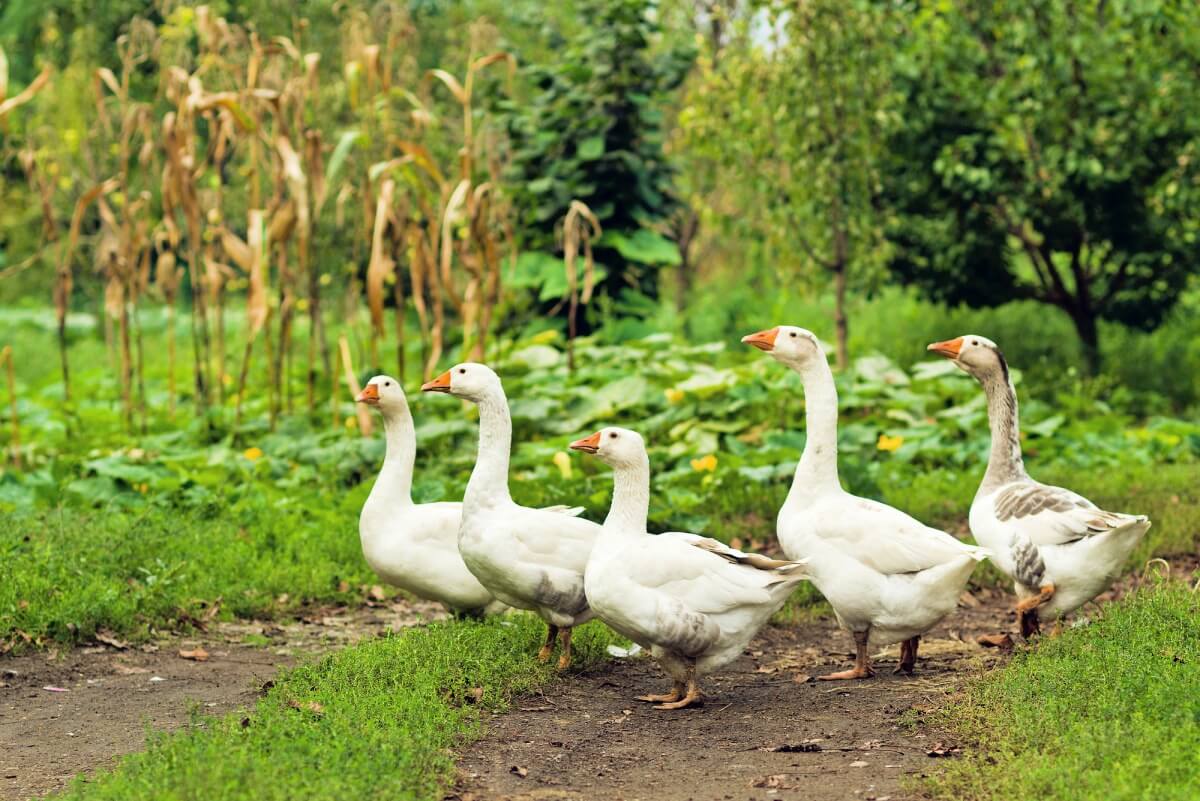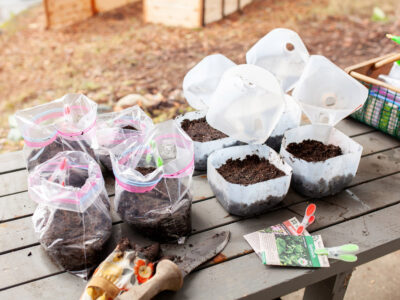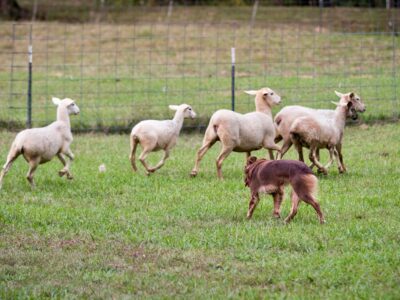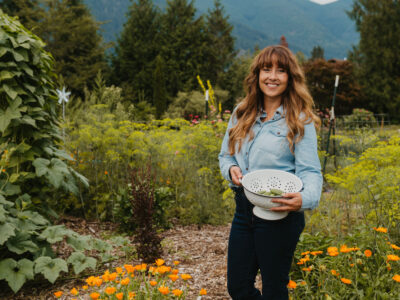Chickens tend be the rockstars of poultry, but many homesteads of old used ducks and geese. Learn why geese are one of the most sustainable forms of poultry and can be an amazing way to earn an income while improving your land and providing for your family.
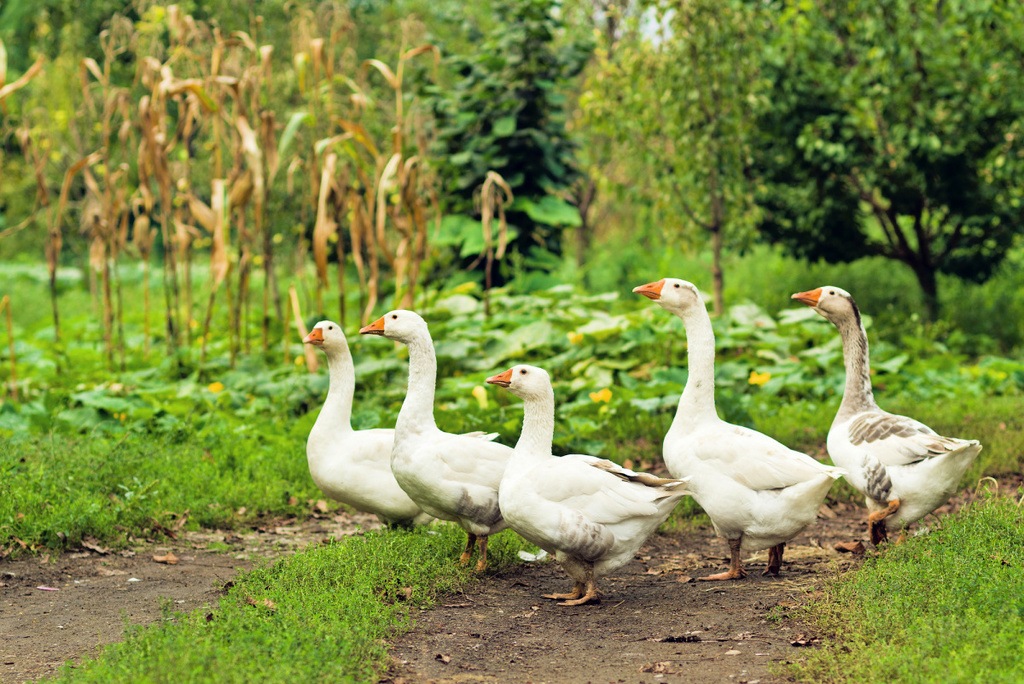
Listen in below to the full podcast, Episode #264 Underused Form of Poultry for Income & Sustainability on the Homestead, of the Pioneering Today Podcast, where we don’t just inspire you, but give you the clear steps to create the homegrown garden, pantry, kitchen, and life you want for your family and homestead.
I’ve raised a lot of livestock over my years but I’ve never gotten into ducks or geese. Morgan and Allison Ebrahimi Gold founded their farm, Gold Shaw Farm in 2016 in Peacham, VT. Gold Shaw Farm is more of a farm startup than an honest-to-goodness farm. Their dream is to one day make their 150+ acre parcel of land a regenerative, productive, and profitable farm. They’re known for raising ducks and geese for meat and eggs, but they also offer tree crops and bare-root seedlings.
When they first bought the property the first thing they focused on was putting in an integrated orchard. When it came time for them to start getting animals on the farm ducks were their first choice because of their insect control capabilities and how they help with weeding. This took them down a rabbit hole of research learning about ducks and geese.
How Ducks Are A Benefit in the Garden
Morgan: In doing the research into ducks, I learned a couple interesting things.
- To raise farm ducks you don’t really need bodies of water.
- They are as efficient of an egg layer for certain breeds as chickens are.
So in doing that research it got me thinking and I realized that around here in the middle of nowhere, like rural egg backyard, egg production is very common. Everybody has chickens. So I thought, how can I be different? How can I stand out and have a product that I can sell people? And I realized that nobody had duck eggs for sale around here. That’s really how we got our start.
Melissa: I’ve had chickens for a number of years. We’ve tried free range and the coyotes had an open buffet, so that didn’t work so well. Plus when we were free ranging, they were quite destructive. I still have a grudge against them. They ate all of my strawberries before I could in one day and I was quite angry with them. They were very destructive to my berry bushes and garden. So I have to keep them out of those areas.
With the ducks with the insect control and weeding, are they not as destructive as the chickens? Or are you just letting them in those areas when you don’t have the crops coming on?
Morgan: It’s sort of a different type of destruction that ducks do. Ducks are not going to scratch and turn things over the way chickens will. Chickens are these little mini tillers walking around your garden. With ducks they have a softer bill and they are going to dig and nestle a little bit around into the crops, weeds, woodchips or dirt. They like to drink from the mud and filter feed off the insects that are going to be in there.
The trick is controlling where you have them. If you put them in with the lettuce patch, they will devour your lettuce. But if you have them in a garden that is taller crops, like a vineyard or tree crops like we’re doing, they’re not going to decimate your Chestnut trees. They’ll go all around and eat around everything else, which is what you want. So it’s also having the right type of crops.
The other thing is to run them through the garden for an hour or two. So rather than let them go in and have full access for days and days and days where they would have time to do all that destruction let them be in the garden for an hour or two to run through and eat all of your slugs and snails and maybe a few other insects. Then they’re out after that time period. Controlling how much time you give them can play a big role in managing how much destruction they create.
Melissa: My chickens don’t really go after slugs and snails but the ducks do?
Morgan: There’s nothing they like better than slugs. Even with ducklings they will go crazy for them.
Melissa: Oh boy. Things may get dangerous here. I’ll have to figure out a way to broach the subject with my husband because the slugs and snails, especially this year, are the bane of the garden. The slugs and snails are so destructive. So I’m a little excited about that.
Morgan: Even in your circumstance I think it’s important. Think about the number of ducks. If you were to get two or three ducks and you pen them up in different parts of your garden and around your property day by day, as long as you’re keeping them moving they’re not going to do too much destruction. But at the same time they’re going to help you manage those pest levels.
Choosing Livestock for Profit & Land Management
Melissa: I’m definitely intrigued now. When you were looking at getting ducks you looked at the overall picture. You knew you were putting in the orchards and considered what livestock would suit it best. Taking some thought beforehand and bringing those in and making it work with what you have in your goals. I think it can be really easy sometimes with homesteading to see what everyone else is doing and get all excited and want to try them. But without really thinking about it sometimes whether it’s going to work best for my environment and our goals.
Morgan: Oh completely. Let me give you an example. I don’t think we will ever have goats on our property. The reason for that is because we have the tree crops. If a goat gets out and does some damage on those tree crops that could set me back two or three years in terms of progress for an afternoon of loose fencing. So that makes it a type of animal that I wouldn’t want to take a risk on just because of the damage it could do to the rest of the farm.
Really thinking about your context and what you have going on around you is so important versus just saying, Ooh, that looks cool. It’s much more about knowing what the most important things to you build that foundation and then build things off of that foundation for adding additional animals or crops or whatever you’re going to do.
Melissa: We had goats and had gotten them to clear brush when we first purchased our property which was just bare land. We had a lot of clearing where we wanted to put the house and the garden, et cetera. So we got some goats thinking that they would really help us with the brush. They did to a degree. We have a lot of blackberry vines, which are actually not native here, but they are an invasive weed. They just take over. So we thought that the goats would really help with them. They did strip the leaves, but they didn’t actually go down and get the roots. They didn’t really clear them.
Since this was land we were developing I planted some landscaping which at the time was a lot of money for us. Those plants had been in for about a week. We had the goats fenced in with electric fencing but somehow they got out in the early morning and by the time I went outside for the day they had eaten all of those plants. The screeching, the neighbors heard I’m sure…I was so mad. I don’t know that we’ll ever bring goats on the property again.
Morgan: It’s all about working within your context. That’s actually how we got started with geese too.
Ducks for Meat & Eggs
Melissa: I definitely want to talk about the geese but I have another question regarding ducks. I understand you got the ducks for the meat and eggs because your market wasn’t oversaturated where you live. You didn’t get them just for your consumption but to sell as well. What are some breeds that are better for egg production versus just meat?
Morgan: There’s a wide variety, just like chickens, that are out there. Some ducks are bigger heavier body birds, like the Pekin or Muscovy. Those are the types of birds that people typically raise for meat production. Here on our farm we mostly focus on the egg piece. That’s why we ended up with a breed called the Khaki Campbell. Khaki Campbell are a small to midsize ducks. They’re lighter weight. Descended from sort of a combination of mallards and runner ducks. They can lay roughly about 300 eggs per year per bird. If you think about some of your most productive chickens, that’s about on par.
That’s the main breed we have here. We have a couple other varieties in the mix too but for the most part we have Khaki Campbell ducks. What we do is we will hatch ducklings or goslings on a regular basis. I have eggs sitting in the incubator across from me in my office. We raise them up, and on the duck side, keep the females for the egg laying but then the males have to be culled. Culling the males is actually a necessity because if you have a skewed ratio too many males and not enough females. It’s actually really bad for your flock, you’re going to have injured, hurt, and sick birds – even dead birds – that happen from the mating. So by trying to keep our numbers where we have roughly five or six females for every drake or male duck, that’s what we’re striving for. That means that we’re also ethically producing meat. So recognizing that the meat is almost a byproduct of the egg business, because you have to manage your numbers and keep those males in check.
Duck vs. Goose
Melissa: Educate me. What’s the difference between a duckling and a gosling?
Morgan: A duckling is a baby duck and a goslings a baby goose. In terms of how you raise them there’s not a significant difference. Probably the biggest difference between the two is that ducks are omnivores. They eat plants and insects so your diet needs are a little bit different than geese who are primarily grazers. So even from the earliest days, for my goslings, I make sure they always get fresh grass and dandelion greens. It teaches them the right things to eat and also gives them the nutrition they need.
I have 40 goslings right now on my front yard just basically mowing down a quarter acre of grass this morning because they are just eating away all that grass. I’m not giving them a lick of feed. They’re only eating grass at this point. So that becomes the most sustainable form of producing meat. So the difference between them is just slightly changing their diet, especially as they age. By the time they’re like, say eight weeks old for either of them, their diets look very different.
Melissa: With your male ducks, at what age are they large enough to butcher?
Morgan: It depends on the breed. For the Khaki Campbell that we have we usually wait until about week 16 or so because they’re smaller birds. I really want to give them a chance to put on some weight. I’m a person who has some strong beliefs around ethical meat. I often feel like the quick turnaround breeds, whether it’s chickens or ducks, are less ideal to me. I understand the economic necessity of it for some folks, but I would rather let a bird get kind of a fuller, longer life through the course of the summer and then harvest it.
Melissa: So it’s about four weeks. That’s about the same time as for a lot of the heritage chicken meat birds. That’s pretty good turnaround time from birth to butchering age for any type of meat.
Morgan: What we’re trying to do here is set-up a cycle. This is our third year of doing waterfowl and what we’re trying to do is actually have a cycle where we get the goslings going first because geese have a shorter breeding season. They don’t lay eggs all year so there’s a finite window for when you can hatch your goslings.
We’ve just gotten through that period of time so now we’re moving full on into duck season. And ideally what we’re doing is trying to raise them all up together at the same time because the geese we’re harvesting at about 20 weeks so that we can do two big butchering days to get most of the birds off here by the time we hit winter. Then we’re just down to our breeding stock again.
Melissa: Gotcha. With the ducks, at that 16 week mark, what’s the average pounds you’re getting per bird?
Morgan: For the Khaki Campbell it’s probably a finished weight of about four pounds. They’re not big birds at all. They’re relatively light but by the time they hit week five or six, they’re getting more than half their diet from the pasture because they’re great foragers. In terms of how much you’re paying for your feed and your feed conversion from that perspective it is pound per dollar, it’s about the same as a heritage breed chicken like a Red Ranger.
Cooking Duck & Goose Meat the Right Way
Melissa: I’ve only had duck twice but when I have had it, it was darker meat and greasier than chicken. Maybe that was how it was prepared. I’m curious about how you prepare it and cook it.
Morgan: With ducks really think about them as the dark meat of turkey but it’s the entire bird. It’s a little fattier and if you don’t necessarily prepare it right it can get kind of greasier. My favorite way to do duck or goose is spatchcocking where you split the bird down the middle in half, spread it out and put it flat. Do that and then roast it in the oven for two hours or so. For the last 10 or 15 minutes throw it under the broiler and let it crisp up the skin. That can’t be beaten and it’s really simple to do it that way. That’s probably our favorite way.
The other thing that we do with the geese, is defrost the goose for the week and get several different meals by parting it out. You can have the legs and thighs be one meal. Another meal from the breasts. For example, right now I have good prosciutto from the breasts curing. Then you have the whole body and neck which makes wonderful soups and stocks. Oftentimes, we we parted out we’ll skin it. If you skin the bird and then red that skin you can get about 16 ounces of fat. Which I think is probably the best way on earth to cook potatoes. If you want to do roast potatoes roast them in goose fat. It will blow your mind.
Melissa: I’m totally getting hungry now. With the geese, obviously they’re a larger bird. I love that you can use one bird and getting several different meals from it. It sounds like you’re actually getting a lot more from a goose because of the size than you would for the ducks, but you don’t have the egg production. For the geese, what’s the average weight once it’s all dress out?
Morgan: The geese are much bigger. I would say a mature goose when we’re harvesting the range, depending on if it’s male or female, between nine to thirteen pounds. Think about it more in the turkey range. Like a heritage turkey. So, the duck is more equivalent to the heritage chicken while the goose is more equivalent to the heritage turkey. The meat quality consistency compared to duck is actually to be very similar in my opinion. I think that is nice in and of itself.
Most Sustainable to Raise
Morgan: But the reason I am probably the biggest proponent of geese above all else is that they are the most sustainable form of poultry you can raise, They’re more sustainable than chickens, guineas, ducks, anything because when it comes down to it, if you’re raising any of those birds, you have a substantial amount of their diet that’s coming in the form of grains that you have to bring onto your farm and pay the feed bill. But if you have access to pastures and grass 85% of your bird’s diet is going to come from the pasture.
So, they’re more like a cow or sheep in terms of what they’re eating from a diet perspective. And in the terms of carbon footprint and the impact on the environment and requirements of inputs and just even the cost to raise, I think actually makes them a much more effective bird to have on the farm. I would say even though we started out really focusing in on ducks over the last couple of years and the more I work with geese the more passionate I become about just how important they are and the value that they have to the farm.
On top if all they’re very good animals to work with. They can get a little loud here and there, but other than that I just find them to be fascinating. Plus, you can also raise geese just for being guard animals. You can take a gosling and put it with some baby chicks and your chickens will forever have a strong protector keeping aerial predators away and helping alert you to trouble, probably keeping a weasel or a raccoon away as well. There’s a lot of benefit there.
How Geese Are Beneficial
Melissa: With drakes you said that there can be issues where they may injure or kill the females but that’s not the case with the geese?
Morgan: No. Geese are actually more monogamous. They will, generally speaking, mate for life or long periods of time. You can have more of a one to one ratio between your males and females. We skew just a little heavier towards the females in terms of what we keep on hand for the breeding stock, just because you can have a little bit of a different ratio and that will give you more for eggs for hatching purposes. But generally speaking you don’t have to control the numbers like you would with ducks.
Melissa: With the geese how many eggs and at what age do they start laying?
Morgan: What we found is that the geese that we hatch out in the spring we give it a year turnaround. In terms of egg production, I found this spring that we were getting about three or four eggs per bird per week. A goose egg, if you’ve ever seen it, it kind of blows your mind with just how big it is. Those big eggs take a long time so you will get eggs for somewhere in the neighborhood of about eight to ten weeks over the course of the spring. That laying period is really the only period you have from an egg production standpoint from the geese. You can eat them or you can hatch them. We try to invest all of our time and energy as we can, or as much as we can in focusing on either selling hatching eggs, hatching the eggs ourselves so that we can then take advantage of adding to our numbers based on kind of the fertility of our breeding stock.
Melissa: So with the geese your not selling the eggs like you are with the ducks. Are you selling the geese when they’re young or are you selling the birds after they’ve been butchered or a combination?
Morgan: It’s a combo. For example, we’ve probably sold about a dozen birds already. We’ve sold probably about 24 eggs for hatching. But we’ll make most of our money in the fall when we sell birds for meat. It’s a good model and if you think about it historically, like the Christmas goose, that’s what people are looking for. We’re looking to harvest late fall so that people can have them on hand whether it’s for Thanksgiving or Christmas or other holidays.
Melissa: That’s pretty cool. With them being a bigger bird and being more aggressive they probably don’t have as many predator issues. What’s your grazing pattern like with them?
Morgan: I actually keep them in chicken tractors right now. I’ll move the tractor during the day and let them free range with some poultry netting around just to keep them from wandering off. I lock them up at night because a weasel or raccoon will keep their distance from a flock of gees but a coyote, bear, or bobcat will still make quick work of a goose. So you do need to protect them. You can’t just treat them as completely free rangers.
I’m actually in the process right now of changing how we do it on our farm. This summer I’m putting in fencing in about an eight acre area that’s going to have five foot high fencing. With that fencing, plus our livestock guardian dog, that’s when I’m going to let the geese just basically completely free range 24/7. But I’m not quite there yet because I feel like you do need some of that infrastructure to keep some of those bigger predators out.
As far as feeding them it really is that easy. You don’t have to truck food out to them as long as you keep giving them fresh pasture. I would say that, if you have 10 geese, you could give them a half an acre for a week and they will clear it out and be ready to go onto the next half acre. You could run them within that space over the span of about eight weeks and loop back through. You’re not talking a lot of space for a fair amount of birds and a fair amount of meat.
Melissa: What do you do during the winter months? Are you feeding them hay?
Morgan: In the winter months I usually switch to corn. They don’t like hay which is a shame. I would really like that to be the case but they just don’t like it. I usually feed them corn as well as a mix of sprouted grains. That’s what makes up most of their diet in the winter months which is why I’m actually very careful to control our numbers down to just the breeding stock. Then go back up in the spring. We had five geese this winter and probably have 65 going right now and then we’ll probably be back down to maybe 10 or 12 this coming winter. So it’s a matter of trying to manage your numbers so that you can keep your winter feeding costs down as well.
If you’re in a rainy more temperate climate where you can see the ground and they can get at the ground, you’re going to find that they can still get more of their diet from the pasture.
Melissa: What would be the most difficult part about raising geese? Do they have any little things that are nuances that are more difficult than others or that we should be aware of?
Morgan: I think this goes for ducks and geese. Water is probably the most complicated thing about it. Earlier I mentioned that you don’t need a body of water to have ducks or geese and that’s true but they do need water to dunk their bills in. The way they drink, the way they keep their faces clean, they need to be able to dunk their head into water, which splashes and makes a mess.
When your brooding baby birds that’s how you get the gross stinky brooder going. As they’re older that’s how you have the risk of getting compaction on your pasture. So having clever ways to manage your water and make sure it’s not becoming a mess, but also making sure that your birds have access to fresh water, that’s probably the hardest part about raising ducks and geese.
Maybe the second hardest part is harvesting. It actually plays back into water too, because they have the waterproof feathers, which makes them much more weatherproof than say turkeys. It actually makes it harder to scald and pluck. So plucking them perfectly clean is much harder as well. Those are probably the two biggest trade-offs that you have if you’re doing waterfowl.
Melissa: Is there a really great tip or trick that you have for the watering?
Morgan: I keep trying to refine it. When they’re babies I always make sure that I actually use chick feeder trays. I fill them with water instead. They can dunk their heads but they can’t go swimming in it. As they get older, what I find is trying to have various types of covers where they can dunk their head in but they can’t get anything more than their head in there. As they get more mature and they are out on pasture, I get large two and a half gallon tubs ans set them up and have a handful of them scattered around the pasture. I just make sure I change them on a regular basis and don’t keep them in the same spot. In doing all of those heads off most of the water issues that you’d have to deal with.
Melissa: They sound like they’re really great for all of those reasons, especially if you have pasture land that you can graze them on. Why do you think geese aren’t as commonly used around the homesteads such as chickens or even ducks?
Morgan: I think there’s a couple reasons. Availability is harder, back to that point I made earlier around having a tighter window for when they’re hatching out and when you can get babies is a much smaller window. I think that makes them less available for folks. Either your in it in April or you’re out for the whole year.
The stereotype that they could be aggressive and dangerous. I think it’s recognizing that there’s a difference from breed to breed and a difference between breeding season and non-breeding season. Some geese, like the Chinese breed of goose is just more aggressive. African geese are much more aggressive versus an Embden or Pilgrim goose which are much more sedate and chill. So I think picking the right breed is important. The other piece is recognizing that during mating season give the geese their space.
I think they are wonderful birds, sweet and loving and really great to work with. You just have to recognize how they operate and what they’re like.
Where to find Morgan
Gold Shaw Farm Website
YouTube
Facebook
Instagram
Twitter
